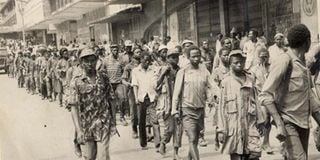It was gunfire as NRA soldiers took over Kampala

National Resistance Army fighters enter Kampala on January 25, 1986. The seemingly tired fighters were cheered by residents as they made their way into the city. File photo
What you need to know:
Account. Last month, NRM celebrated 30 years since it stormed Kampala. This week in Witness Henry Lubega revisits the recollections of a former news editor and anchor at the only radio and television station in the country at the time, Caroline Lamwaka (RIP), recorded in her forthcoming book, The Raging Storm to be published by Fountain publishers.
On the morning of Thursday January 23, 1986, I left the UTV studios in Nakasero to go home at my uncle’s residence a few meters from the station on Nakasero Road.
My uncle had just retired as a director at the ministry of Information and Broadcasting to join politics. At home, I found him with his six- year-old granddaughter and house help called Tom. The rest of the family was in Kamwokya, Makerere University and Mulago Medical School studying.
The next day, the battle for Kampala and strategic institutions like Radio Uganda and Uganda Television in Nakasero intensified. We had to take cover in what was thought to be the most secure place in the house. The soldiers at UTV were shelling towards western Kampala directly over our house, while the NRA rebels returned fire from the opposite direction.
Sometimes I would wonder if we would survive the crossfire. A couple of times I would go to the top floor to watch the ongoing battle with Tom, seeing plumes of smoke billowing from the horizon in parts of western Kampala around Rubaga Cathedral and Makerere University.
Then suddenly, the shelling stopped on Saturday. This brought unbelievable silence and great relief which eased the fear and tension we had been under.
We heard voices in Luganda outside the gate and my uncle said “the game is up, the guerrillas have taken over power”. Throughout that Saturday, we remained indoors monitoring events on BBC Radio courtesy of Henry Gombya who was reporting from Kampala.
At about midday on January 26, there was a faint voice of Yoweri Museveni on Radio Uganda. Unlike in the previous announcements by the UNLA officers, his was in an orderly manner and style.
When the NRA took over Kampala, they stopped the looting that had begun. They set a standard, no looting, no killings. On the morning of January 27, two of my uncle’s children and one of their friends came from Makerere University and medical school in Mulago, to check on the family. They talked of victimisation of northerners where they were coming from by some people from the south.
However, at UTV and Radio Uganda when I reported for work later that day, it was a different story. Gen Salim Saleh together with other commanders assured the people who had gathered around after the takeover that NRA did not come to harm anybody or to revenge.
Meanwhile, before leaving the station on January 23, one of the soldiers manning a 14mm gun at the northwestern entrance of the premises, told me as I was leaving to go home that if I find the people at home gone, I should come back to the station and stay under their protection.
Swearing in
Tens of thousands of people turned up at the parliamentary building spilling over to the nearby streets for the swearing in ceremony of the new president. Like many of the people from northern Uganda, I had not known Museveni the politician and the guerilla leader, nor grasped the concept of his politics before and during the Bush War.
There was generally extraordinary enthusiasm for Museveni in western, central and southern Uganda where many people clearly viewed him as a liberator.
His coming to power was viewed as a dawn of a new era. In his address to the nation after taking the oath, Museveni promised to restore the rule of law, adding that the security of the person and property was a basic right for citizens not a favour given by regimes.
He was young, educated and had an aura of authority and self-assertiveness about him that made him seem promising to many.
Brief background about NRA bush war
In February 1981, shortly after the new Milton Obote government took office, Yoweri Museveni, then a former Military Commission member, and his armed supporters declared themselves the National Resistance Army (NRA).
Museveni vowed to overthrow Obote by means of a popular rebellion, and what became known as “the Bush War” began. The war began with an attack on an army barracks in Mubende District on February 6, 1981.
In December 1985, Tito Okello’s government signed a peace deal, the Nairobi Agreement, with the NRA. However, the ceasefire broke down almost immediately, and in January 1986, Salim Saleh commanded NRA’s assault on Kampala, which eventually led to the demise of Tito Okello’s regime with Museveni becoming president. NRA became the national army, and was later renamed Uganda People’s Defence Forces (UPDF).
About Lamwaka
Caroline Lamwaka was a war and peace journalist and researcher. She has covered the civil war and peace process in northern Uganda. She was born in Uganda on January 01, 1963 and passed away on March 05, 2006 at the age of 43. Her memoirs, The raging Storm, will soon be published by Fountain publishers.




